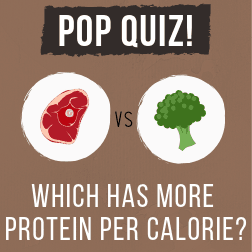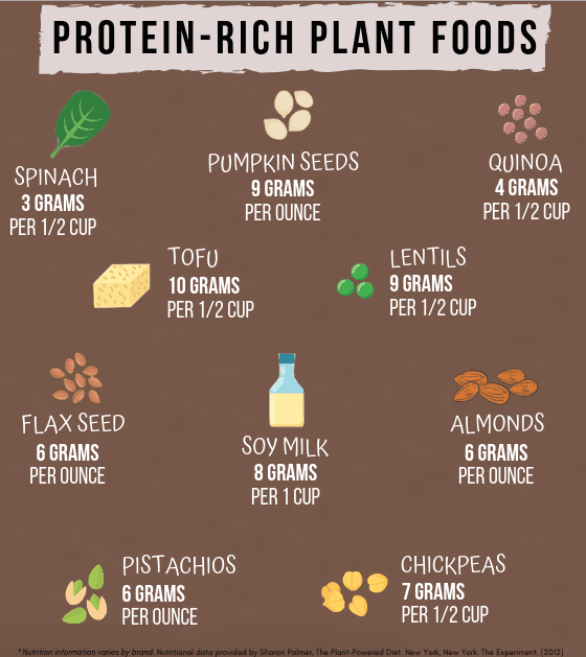Phil* was determined to keep his New Year’s Resolution to go to the gym. He heard a lot of chatter about the importance of protein, especially among the muscle bound gym rats who can dead lift a small nation. He was curious so he asked how he too could have bulging muscles. Their advice was based on good intentions and a desire to help a fellow gym buddy. The problem is, their advice was not based on sound nutrition and in fact could cause more harm that good. They were sharing what they were told and are now practicing. But it is simply not true.
The fact is that Americans get far more protein than they need. Americans eat on average 100 grams of protein per day, which is almost double the recommended daily allowance. More is not better! People eating the Standard American Diet (SAD) often take in an excess of 30 percent (and higher) of their calories from protein. Most of the protein we consciously choose comes from animal products. Yet, this type of protein will deplete calcium from our bones, increase the work on our kidneys, add stress on our heart and promotes cancer. Just to name a few of the concerns surrounding the consumption of excess protein.
We all started at the same point in elementary school where we were taught that the body needs protein to build muscle. Then we quit learning. Human nutrition is likely the subject that most people know the least about and this includes many health professionals treating disease caused by excesses and deficiencies in our diet. It is also the very subject that determines how we live our life.
It’s time to re-evaluate what we thought we knew and expand our knowledge from reliable sources whose education and life work revolves around nutrition.

But don’t take my word for it-
Joel Fuhrman MD, board certified physician and president of the Nutritional Research Foundation, who was himself an Olympic athlete, asked which has more protein-oatmeal, ham, or a tomato? According to Dr. Fuhrman, the truth is that they all have about the same protein per calorie! Investigate a little further and you will begin to see the benefits of your new way of thinking. The ham comes with extra saturated fat and cholesterol which we can agree is not good for you. In addition, the pig used up all the micronutrients that our bodies needed! On the other hand, the oatmeal and tomato have fiber and other powerful micronutrients, so it is a bigger bang for your buck.
There is an outdated belief that plant protein is incomplete and it must be mixed and matched to obtain what the human body needs. This again is simply not true.
Almost any assortment of plant foods contains about 30-40 grams of protein per 1,000 calories. If your caloric needs are met with these plants then your protein needs are automatically met as well. Focus on eating natural plant-based whole foods then forget about the protein debate. Plant protein is different from animal or processed protein. Your body will take what it needs from plant protein and get rid of the excess.
Do athletes need more protein? If they are training intensely for several hours per day or are heavy weight lifters, this may be true. But they also need more of everything else like: extra fat, extra carbohydrates, and extra micronutrients! Their increased appetite will take in the needed additional calories and meet their other dietary needs as long as they are eating healthy plant-based whole foods instead of high calorie junk food. For example, Nathaniel Jordan is a body builder and world-class powerlifter who eats a totally plant-based diet. He does not supplement with protein powder or worry about his protein intake. He is a world class athlete. Weighing 165 pounds, with about 5 percent body fat, Nathaniel can bench press 275 pounds, squat 445 pounds and deadlift 600 pounds – and counting. Most of the people working out next to you in the gym are not full-time athletes, so if Nathaniel does not need the extra protein then neither do you or your gym buddies.
What builds muscle?Strength training builds muscle. If you want to have well defined and big muscles then you have to put in the time just like your well-meaning gym buddies who always seem to be at the gym and work out consistently.
Back to Phil*Phil is the name of a dear colleague of mine. He and I would have intense discussions on his protein powder habit. In the short term, his muscles were big and even though he worked out hard, Phil was convinced that the protein powder was responsible for his success. I won the debate but lost a dear friend – Phil’s life was cut short when he died of kidney failure at a very young age. His doctors said it was Phil’s type of protein and the excess intake that destroyed his kidneys. The problem with kidney failure is you may not recognize the symptoms until it is too late. Phil did a lot of good in the world and the world is a bit empty without him. In memory of Phil, I hope someone reading this will re-evaluate their own protein intake. The science is out there if you look at reputable sources without any conflict of interest. That is the key to all information in the world today…you must follow the money in order to find the truth.

